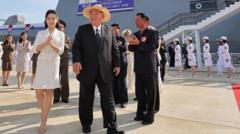Ivory Coast's President Alassane Ouattara declares that the Ivorian military has been sufficiently modernized, making the presence of French troops unnecessary.
# French Troops Set to Withdraw from Ivory Coast Amid Regional Shift

# French Troops Set to Withdraw from Ivory Coast Amid Regional Shift
Ivory Coast announces the imminent withdrawal of French forces, signaling a decrease in France's influence in West Africa.
In a significant turn of events for West African geopolitics, President Alassane Ouattara announced that French troops stationed in the Ivory Coast will withdraw from the country this month. This decision, which indicates the declining influence of France in the region, follows similar exits by French forces in other West African nations, including Chad and Senegal.
During a televised address on New Year’s Eve, Ouattara stated that the Ivorian military had undergone a modernization process that rendered French assistance no longer necessary. “We can be proud of our army, whose modernization is now complete,” he proclaimed to the nation. As part of the withdrawal, French forces will relinquish control of a military camp located in a suburb of the Ivorian capital, Abidjan.
France, historically a dominant military presence in West Africa, has not publicly commented on this withdrawal, which is representative of an ongoing trend across the region. The French military's role in Africa has retreated significantly, now focused primarily on its bases in Djibouti and Gabon. Just three years ago, France had a substantial military contingent engaged in combating jihadist groups in the Sahel.
The recent surge of anti-French sentiment in former colonies has been prevalent, with growing accusations of neocolonialist tactics and condescending attitudes toward local affairs. In countries within Africa's "coup belt," where governments have recently been overthrown, military juntas have capitalized on these sentiments, fostering a narrative that resonates with the public.
This withdrawal marks another critical phase in the evolving dynamics between France and its former territories in Africa, reflecting a shift in power and the rise of nationalistic sentiments among Ivorian leaders. The Ivorian government’s decision underscores its confidence in its military's capabilities and aligns with the broader regional movement toward self-sufficiency and reduced reliance on former colonial powers.
During a televised address on New Year’s Eve, Ouattara stated that the Ivorian military had undergone a modernization process that rendered French assistance no longer necessary. “We can be proud of our army, whose modernization is now complete,” he proclaimed to the nation. As part of the withdrawal, French forces will relinquish control of a military camp located in a suburb of the Ivorian capital, Abidjan.
France, historically a dominant military presence in West Africa, has not publicly commented on this withdrawal, which is representative of an ongoing trend across the region. The French military's role in Africa has retreated significantly, now focused primarily on its bases in Djibouti and Gabon. Just three years ago, France had a substantial military contingent engaged in combating jihadist groups in the Sahel.
The recent surge of anti-French sentiment in former colonies has been prevalent, with growing accusations of neocolonialist tactics and condescending attitudes toward local affairs. In countries within Africa's "coup belt," where governments have recently been overthrown, military juntas have capitalized on these sentiments, fostering a narrative that resonates with the public.
This withdrawal marks another critical phase in the evolving dynamics between France and its former territories in Africa, reflecting a shift in power and the rise of nationalistic sentiments among Ivorian leaders. The Ivorian government’s decision underscores its confidence in its military's capabilities and aligns with the broader regional movement toward self-sufficiency and reduced reliance on former colonial powers.




















